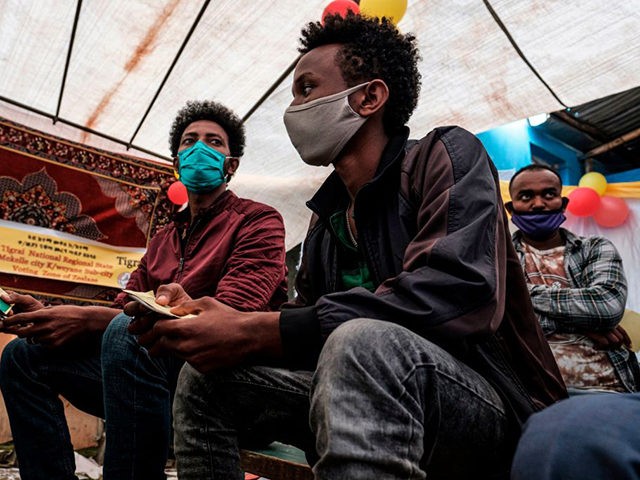The attorney general of Ethiopia said on Thursday that citizens could be jailed for up to two years if they fail to wear masks in public or violate other restrictions intended to control the spread of the Wuhan coronavirus.
“Now it is as if [Chinese coronavirus] is no longer there, the public is not taking care. This will cause a possible increase in the spread of the disease and might be a threat to the nation,” Ethiopian Health Minister Lia Tadesse complained on Thursday.
Other behavior that could see Ethiopians jailed includes shaking hands, seating more than three people at the same table, and failing to remain more than “two adult steps” away from others.
Ethiopia has been in a declared state of emergency since April because of the virus. As of Friday, it has reported 91,693 cases and 1,396 deaths. The population of Ethiopia is about 115 million.
Ethiopian Prime Minister Abiy Ahmed said this week that the pandemic “did not affect Ethiopia as it did in other countries,” thanks to “coordinated efforts” against it.
“However, the damage will be worse if we do not return to a state of normalcy while taking precautions,” he added. “Let’s keep our distance, wear masks, and keep our hands clean.”
Coronavirus infections reportedly surged in Ethiopia over the summer, combining with flooding and a plague of locusts to create a humanitarian crisis. Insect control experts said the coronavirus disrupted the supply of pesticides and special equipment needed to combat the locust swarms. Another wave of insects is expected to hit Ethiopia next year.
Human rights activists also blamed the Wuhan coronavirus for increasing child labor and child marriage in Ethiopia. Some 16 million children, as young as five years old, were estimated to be used as labor before the pandemic struck.
“Because of the economic challenges, many parents of low socio-economic status were obliged to use child labor and this might be exacerbated unless we reopen our schools,” Yhannes Wogasso of the Ethiopian Ministry of Education explained.
International observers said the pandemic disrupted Ethiopia’s systems for monitoring child labor and child marriage, and the networks that help children report abuse. They fear deepening poverty will prompt more families to keep their children out of school and send them to work instead, or marry their young daughters off.
Studies of the pandemic in Ethiopia and other African nations have yielded conflicting results. The African continent is generally seen as relatively resistant to the coronavirus because its population skews young, it has low rates of obesity, its large rural population tends to be isolated, the people are not as mobile as Americans or Europeans, and Africans are — for better and worse — more experienced at dealing with pandemics and similar health crises.
On the other hand, African nations generally lack the medical resources of Western countries, including the ability to perform widespread tests on the population, so the true number of coronavirus infections and deaths can be difficult to monitor. The Ethiopian government would appear to believe it faces a much worse coronavirus crisis than its reported number of infections and fatalities would suggest, and it could point to the looming food crisis from flooding and locusts to argue that it has limited ability to absorb another coronavirus surge.

COMMENTS
Please let us know if you're having issues with commenting.